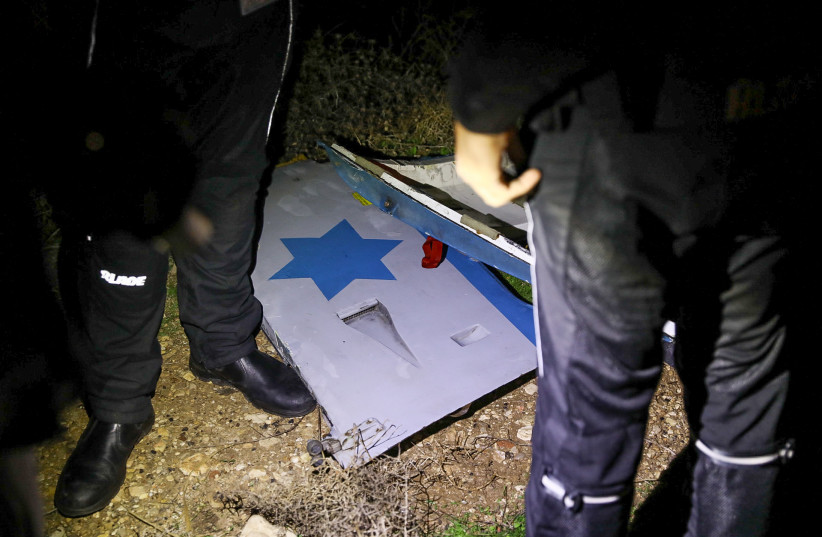Sadly, Israel is no stranger to the death of its soldiers.
Throughout its nearly 74 years, it has known more than its share of soldiers killed either in military action or training accidents. The vast majority of the time, the news is not published until the families of the fallen have been notified.
The rationale is simple.
First, it is not humane for relatives to initially hear of the death of a loved one on the radio or television. Second, spreading news of an incident involving the death of soldiers or pilots before the relatives have been informed or before the IDF has made an official statement will cause all those with loved ones in the army or air force to worry about their kin, fearing they may have been involved.
In the past, the military censor ensured that the print and broadcast media would not infringe on this rule. But beyond that, there was always an unstated agreement that, as the British say, certain things are just not done, and rushing to spread the news about a military tragedy was one of those things not done in Israel.

On Monday night, what should not be done was done, and news that an IDF helicopter crashed in the sea, and there were fatalities, spread long before the IDF put out an official announcement.
Many rushed to be the first to report the news. Former Navy Commander Eli Marom sent his condolences during a television interview to the family of the two pilots killed in the crash, even before the families were informed.
The head of the Knesset’s Foreign Affairs and Defense Committee, Yesh Atid MK Ram Ben Barak, told the Knesset plenum at about 10:00 p.m. – about an hour after news of the crash had already broke – that all three crewmen were rescued. And a couple of hours later, Likud MK David Amsalem said from the Knesset podium that two crewmen were killed and one rescued. And all of this before the IDF put out a formal statement about the incident.
A number of different elements were at work here.
First, the helicopter crashed off the coast of Haifa, and many people on the beach saw it go up in flames. This was not the case of a plane falling in the middle of the desert out of sight. People saw this as it happened, filmed it, and put the clips on social media in real-time. If a military accident happens in the middle of nowhere, the IDF may have the “luxury” of waiting a few hours until the facts are ascertained and the relatives of the deceased notified, before releasing the information.
But not if it happens in full view of the public. Then the IDF Spokesperson’s Unit needs to act with alacrity, well aware that the information will spread quickly.
In the best-case scenario, only the basic information spreads, such as a helicopter going down in the sea. In the worst-case scenario, misinformation spreads, such as that the fallen helicopter was somehow connected to the anniversary of the killing of Iranian Revolutionary Guards Corps commander Qasem Soleimani, or that all the crewmen were rescued. And this misinformation has free rein to spread in absence of an authoritative statement from the IDF about what happened. The IDF needs to get the story out there fast because if it doesn’t, false information is going to circulate.
On Monday night, the IDF did not get its account out there fast enough, and the false information of what happened spread swiftly.
This leads to the second element at play: the changing media landscape. The security establishment has for most of the last seven decades been able to control information. There have been certain well-known exceptions – such as the Bus 300 affair in 1984 – but in the days before social media, when people received their information from newspapers, television and radio, the IDF, through the censor, was able to keep a tight lid on any information, preventing in the name of national security what it believed to be sensitive information from getting out.
But those days are over. Social media has shattered the gentleman’s agreement that existed for so long between established media outlets in this country and the IDF. Now it is not enough for the censor to call an editor to quash a story deemed sensitive to national security. Now everyone with a Twitter handle or Facebook page can upload what they desire. While the information landscape has adjusted dramatically over the last 25 years, the IDF has not adjusted its modus operandi accordingly.
The other issue at play here is the drive to be first. Every media outlet, and – as Marom, Ben Barak and Amsalem demonstrated – individuals as well, want to be first to run and tell the world that certain things have happened. For news outlets, it is the feverish quest for the scoop; for individuals, it is often a desire to show off that they are in the know, that they have information that others do not.
But common decency in cases like these demands restraint. As IDF Spokesman Brig.-Gen. Ran Kochav tweeted Tuesday morning, “I condemn the publication of information about the injured soldiers from the helicopter last night, before it was cleared for publication. Publicizing information before the families were officially notified, and that despite clear requests not to publicize the details, is a blatant violation of a procedure that has been respected for decades and which is based on concern for the families in their difficult hour.”
The “procedure that has been respected for decades” reflects common decency and needs to be upheld. But at the same time, the IDF needs to work harder to get information out to the public immediately so that a vacuum is not created, where all kinds of information – both true and false – circulates hours before the IDF says anything definitive.
